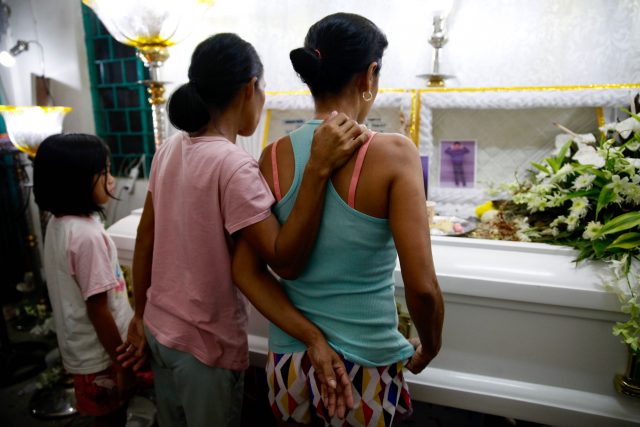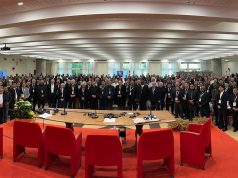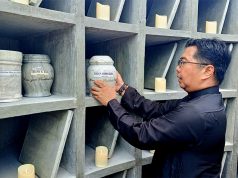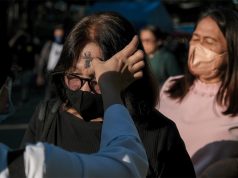
MANILA, Philippines — It has been a year since “Raquel,” 55, lost her son and daughter-in-law when gunmen barged into their home in Caloocan City. The couple left behind two children, a nine-year-old boy now in Grade 4, and an eight-year-old girl in Grade 3.
With some help from a relative and the parish she belongs to, Raquel manages to keep her grandchildren in school.
But the killings continue to haunt the children. The boy still dreams of his parents, saying: “Tinatawag ko si Mama, ayaw ako pansinin (I call Mama, she just ignores me).”
Since Rodrigo Duterte won the presidency in May 2016, the communities served by the Our Lady of Lourdes parish have lost 82 persons as of October 7, the youngest a nine-year old killed last December, said Fr. Luciano Felloni, an Argentine who has been serving in the Philippines for 23 years now.
Under Felloni’s leadership, the parish tied up with private institutions to provide scholarships to orphans, debriefing to families, and rehabilitation to drug dependents.
But they particularly need help with livelihood assistance, said the priest.
“Livelihood is very essential,” he told InterAksyon during a recent gathering where the orphaned families received groceries and cash assistance from a group of donors who had learned of their plight and raised funds online.
“So kung anong (whatever) livelihood, talagang very open ito (this is really very open). Puwedeng (it can be) any kind of thing,” Felloni said.
“For the drug recovery, we have two livelihoods, one is printing of T-shirts, another is they produce liquid hand-soap, dishwashing (soap), and sanitizer. So this is for the recoverees. For the EJK families, anything would really help,” he added. “As of now, we are giving basic financial help to start up a little something, so selling vegetables, selling fish … But another kind of livelihood would be very helpful, if someone has, for example, I dunno, mga bagay na puwedeng ibagsak at sila ay i-box or ibalot o pack (items that can be dropped off here for them to box or wrap or pack), something like that. Companies need to outsource part of their production line, that would be very, very helpful.”
Those who wish to donate can drop by the parish in Barangay 175 Camarin, Caloocan City, or make a deposit to the following BPI account.
BPI account name: RCBN Our Lady of Lourdes Parish
BPI account number: 9903-0157-45
From ‘pakikiramay’ to reintegration
Fortunately, the Our Lady of Lourdes Parish’s programs for the families of victims, and for drug dependents, spurred by the killings in the community, have gotten attention.
“‘Yung unang naisip namin is makiramay. ‘Yung una is right after, ‘yung tulong na minsan pagkuha ng bangkay, pag-process ng papeles sa pulis. Minsan funeral assistance, ganu’n. Tapos, of course, ‘yung spiritual, immediate na i-bless ‘yung patay (The first thing we thought of is to condole with them. The first step is right after, providing help with getting the body, processing the paperwork with the police. Sometimes funeral assistance is included, too. And of course, the spiritual aspect, the dead must immediately be blessed),” Felloni said.
“Then we assess the need, kasi ‘yung iba ay scholarship dahil naiwan sa lolo at lola, walang pambaon (because others need scholarships because they were left with their grandfathers and grandmothers, and they have no pocket money), so we tied up with some institutions and also private (individuals) to give a scholarship assistance,” he added.
Another essential component is debriefing. Felloni said this is provided through a tie-up with graduate students of psychology from St. Scholastica’s College. “They crafted the modules. They do it in the church, they are the ones (who administer it) because they are the professionals. So we host. They did one for families, they did one for kids,” the priest said. “And then now we’re trying to go into livelihood.”
There is also a “very strong” six-month rehabilitation program in place for drug users, undertaken with barangay officials and the city government, which has graduated 21 with 41 soon to follow. Patients are seen by psychologists and psychiatrists and provided counseling and livelihood training from Monday to Saturday, among others.
The ultimate goal for Felloni is reintegration. “Mawala ‘yung stigma and maging aktibo sa komunidad (for the stigma to be erased and for them to become active in the community),” he said.
‘A sector in crisis’
Reaching out to affected communities and “sharing time, talent, or treasure” is a concrete way of protesting against extrajudicial killings, said Milet Mendoza, a veteran humanitarian and social development worker with the Diocese of Novaliches, to which Our Lady of Lourdes Parish belongs.
She is particularly involved in the AKAP Program, which tries to “weave positive interventions and get all key sectors of government involved.”
Mendoza was present at the Our Lady of Lourdes gathering, where she told the families of plans, hopefully with donor support, to build a play area that will also serve as a recreation center for orphaned children and the “orphaned elderly” of the parish. Here, catechism, feeding, and educational activities will be held for those left behind.
She lamented that the local and national governments have not realized that the families left behind by extrajudicial killings “is already a sector in crisis.”
Because of this, she has taken it upon herself to put together a “menu of services” for poor families which can be sourced from the local and national governments. “Let us give the right to the people to access and avail of what is due them. After gathering the basic menu of social services, I come up with a summary of qualifications, requirements, and services,” she said.
Mendoza then returns to the communities and tells them what kind of assistance they can — and should — get from the government.
“It is most unfortunate that there is seemingly no proactive government stance to get these orphans to access government social services,” she said.
And it gets worse.
“We have heard of stories of beneficiaries of 4Ps being excluded once they have been related to EJK cases. They have not recognized that you have here a situation of orphaned elders and children that have lost their breadwinners,” she stressed.
Explaining the possible extent of the crisis, Mendoza said: “We are possibly talking about at least 18,000 orphaned children. If it were true that you have at least 13,000 dead people and, just taking half of that, say 6,000 people with three children each, (then) you have at least 18,000 orphans. What do you do with that?”
Social injustice, trauma, and poverty are a deadly combination, Mendoza warned.
“Every day, they have to think about where to get the food. But more critical than appeasing the hunger pangs (are) safety and security. ‘Will the rest of us be killed?’ Just the mere sound of a motorcycle brings shivers to people in the communities. Children hide under the table or (in) their closet,” she said.
Nevertheless, outreach activities by private individuals give these communities hope, even if it may seem like a drop in the bucket.
But if Good Samaritans can pool their resources so that those left behind can go on with their lives, she wonders, why can’t mandated government agencies and elected officials who have millions of pesos do something for these families?
‘Sitting ducks’
“What pains us even more is when we have been made aware that our own duty-bound protectors are the ones killing us. Where do we run to for help?” Mendoza lamented. “And we know that we don’t want this society to bring the law into their own hands in the way that the President does. I don’t want the good and young policemen to be on the receiving end of revenge due to the actions of their comrades, those scalawags in uniform. We want to keep and preserve the good ones.”
She holds the widely shared suspicion that most of the victims of the government’s war on drugs were not armed, contrary to what authorities insist.
“Even wars have rules. Unarmed, hapless people are not supposed to be executed … We have many cases of people on their knees pleading for their lives and still they get shot in cold blood. People have become sitting ducks,” Mendoza said.
And it doesn’t end there as she points to the growing culture of violence inculcated in the minds of the young, especially those who have seen how their parents were killed.
“What if that vengeance is ingrained in their hearts at a young age? Then now you will see people beginning to sell guns. It is going to be a ‘wild, wild west’,” Mendoza said.
Nevertheless, she pointed out that faith-based institutions like the Diocese of Novaliches, which covers 25 barangays in Quezon City and Caloocan City, continue to engage with the Philippine National Police.
“We believe that there is a need to facilitate, to bridge with a few sincere allies within government institutions, even as some of these groups are deemed as EJK perpetrators. If someone among them wants to sincerely apologize and start the process of healing and genuine reforms, we are here to facilitate that,” Mendoze said.
She also reminded government officials that their institutions will stay on after Duterte’s term.
“There will be a day of reckoning for public accountability,” she said.









